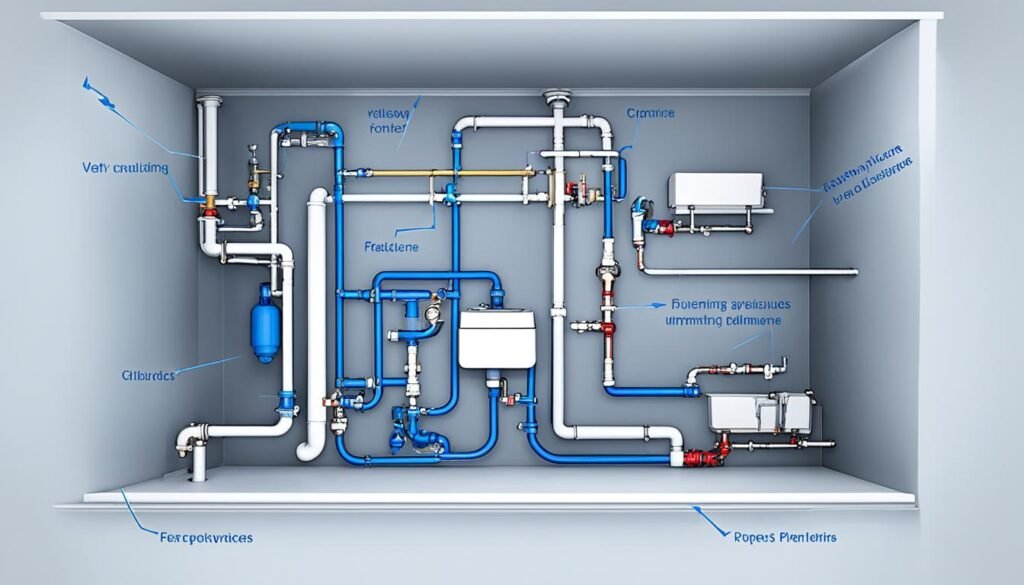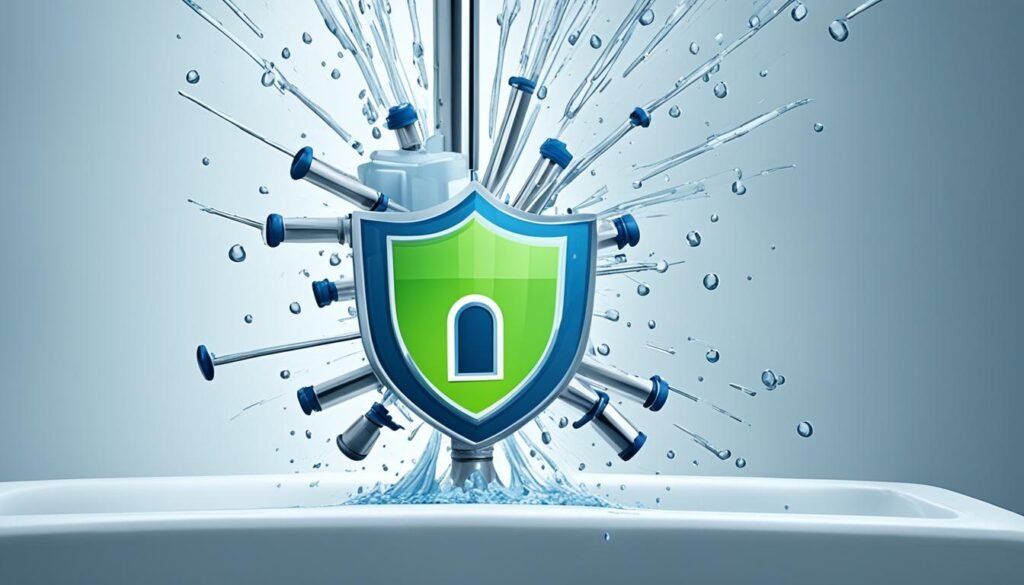Did you know water damage costs billions each year? It’s a big problem that can hit homes hard. Homeowners are often left with huge bills and stress. Yet, you can take steps to guard your home against water damage.
Key Takeaways:
- Water damage is a common and costly disaster that requires homeowners to take preventive measures.
- Understanding your insurance coverage for different types of water damage is important.
- Proper maintenance of your home, including sealing basements and maintaining indoor plumbing systems, can help prevent water damage.
- Consider additional coverage for sewer and drain backups and flood damage.
- Storing belongings properly and keeping an up-to-date home inventory can minimize loss in case of water damage.
Preventing Basement Water Seepage
One common cause of water damage in homes is basement water seepage. This happens when cracks form in foundations or floor slabs. To stop this, it’s key to reseal the basement and use water sealant on weak spots.
Making sure water flows away from the building is crucial too. You can do this by fixing grading issues and putting in a backwater valve. These steps will keep your basement dry and avoid expensive fixes.
Water Seepage Prevention Tips
Here are some top tips to avoid basement water seepage:
- Regularly check for and mend cracks in your building’s foundation or slabs.
- Put a new seal on the basement and cover weak areas with water sealant.
- Solve grading problems to make sure water drains properly.
- Add a backwater valve to stop sewer backups.
- Keep gutters and downspouts clear to help water flow right.
- Point downspouts away from your home’s foundation.
- Think about getting a sump pump to pull out extra water from the basement.
“Preventing basement water seepage is crucial to protect your home from water damage and costly repairs.”
By using these tips to prevent water seepage, you can cut down on the risk of hurting your basement. This keeps your home safe.
Maintaining and Understanding Indoor Plumbing Systems
Keeping your indoor plumbing systems in check is key to avoiding water damage. It’s smart to look at appliances like hoses and faucets every year. Look for any leaks or cracks that need fixing. Also, changing these parts every five to seven years helps stop leaks.
Checking appliances like hoses and faucets annually can spot leaks or cracks early. Fixing or replacing them is crucial.
It’s also vital to check your showers and tubs for any seal issues. Over time, these seals can get worse and lead to leaks. By keeping an eye on them and resealing when needed, you stop water damage.
Before heading out on a trip, remember to turn off your washing machine’s water supply. Also, never leave while the washer or dishwasher is running. This simple step can keep away plumbing disasters and water damage when you’re not home.
Knowing where your home’s main water shut-off valve is, is crucial. If a pipe bursts or a hose is damaged, you can quickly turn off the water. This action helps control the situation and reduces damage.
Adding an emergency pressure release valve is a smart move. It guards against frozen pipes that can burst. This valve lets out extra pressure from your plumbing, lowering the risk of leaks and damage when it’s very cold.
It’s also crucial to check your plumbing and heating pipes often. Look for any cracks or leaks on exposed pipes. Fixing these issues promptly keeps your plumbing system working well.
Maintaining Indoor Plumbing Systems: Key Tips
- Inspect appliance hoses and faucets annually.
- Replace appliance hoses every five to seven years.
- Reseal showers and tubs for watertight seals.
- Shut off the water supply to the washing machine before going on vacation.
- Know the location of the main water shut-off valve in your home.
- Install an emergency pressure release valve.
- Regularly check plumbing and heating pipes for cracks and leaks.

By sticking to these maintenance tips, your indoor plumbing will stay in top shape. Preventing leaks and water damage is easier with regular upkeep and fixing problems on time. Consistent care is the secret to a dependable plumbing system.
Conclusion
Water damage prevention is key to safeguarding your property and money. Using the right methods, homeowners can dodge the harsh effects of water damage. This keeps your home safe and your wallet full.
It’s smart to know what your insurance covers. Adding extra coverage for things like sewer back-ups and floods is wise. These aren’t usually covered, so check your policy.
Keeping up with home maintenance stops water damage. Make sure your basement is sealed tight. Know your plumbing well to avoid leaks. And protect the outside of your home too. Keeping things tidy and an inventory updated helps if damage does happen.
These steps will help you avoid big repair bills from water damage. Protecting your home is easier than fixing it. So, it’s worth taking these precautions seriously.


